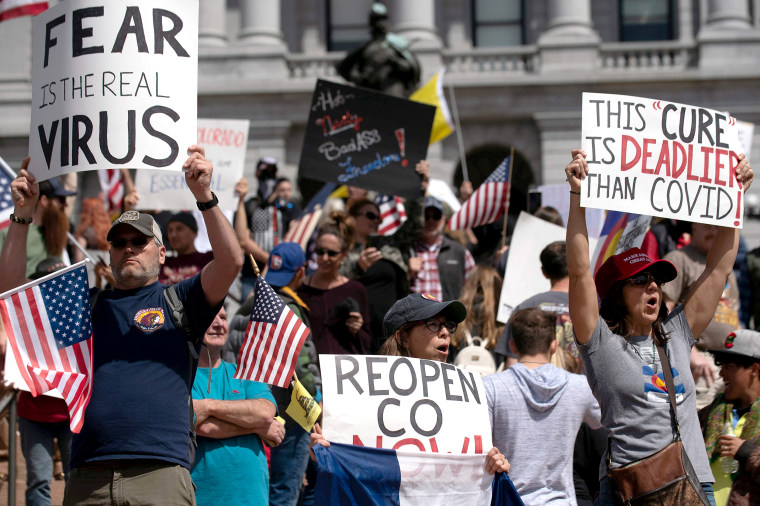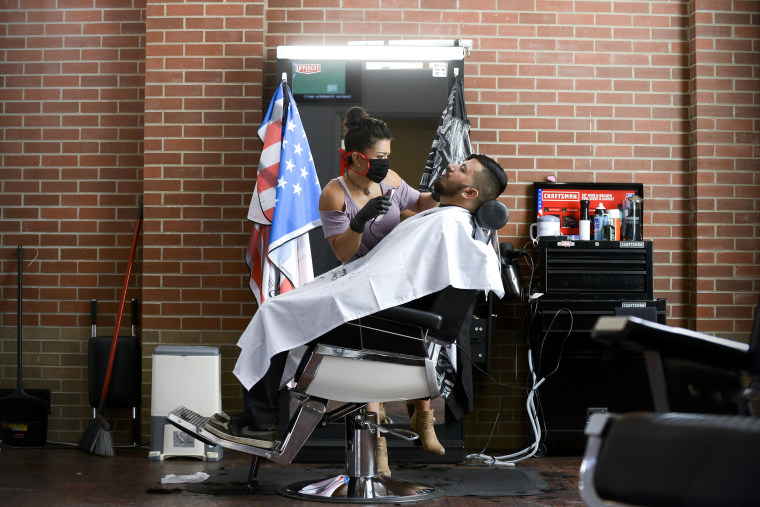Across the country, it's largely Republican governors who are moving expeditiously to ease coronavirus stay-at-home orders and reopen swaths of their states' economies. Critics warn they're moving too fast.
But in Colorado, it's a progressive Democratic governor who's accelerating the reopening process.
Gov. Jared Polis announced a relaxation of his state's stay-at-home edict two weeks ago, permitting curbside retail sales, real estate showings and voluntary or elective medical, dental or veterinary procedures. On Friday, a wider reopening was permitted, as retailers can allow in-person shopping. Barbershops, salons, personal trainers and tattoo parlors were allowed to restart, too — all must observe strict social distancing guidelines. And on Monday, offices will be allowed to reopen with up to 50 percent of their workforces.
"Jared isn't following Republican governors — he's leading Democratic ones," said Ted Trimpa, a Colorado-based Democratic strategist who has known Polis for roughly 15 years.
Of the 24 states reopening early, 17 are led by Republicans and seven by Democrats, according to the NBC News state tracker. Colorado and Montana were the two Democratic states moving most quickly to begin to get back to normal.
Full coverage of the coronavirus outbreak
Polis, 44, became the first openly gay politician to be elected governor in U.S. history in 2018. Before that, he served five terms in the House representing Colorado's 2nd Congressional District. While in Congress, he was the only Democratic member of the House Liberty Caucus, a small group of libertarian lawmakers founded by Rep. Justin Amash, I-Mich., who left the Republican Party last year.
"Jared is a unique individual, and to say that he is a cookie-cutter, standard public official or politician just isn't the case," Trimpa said. "He's always blazed his own trail. And he's confident as to where he's going."
As is the case for many of the nation's governors, polling shows Polis maintaining high approval for his handling of the pandemic. A Microsoft News poll showed him getting 75 percent approval for his handling of the outbreak in Colorado. Just last week, Polis announced that his state secretly bought 100,000 tests from South Korea, keeping the purchase under wraps to avoid seizure by the federal government.
Colorado, once considered a key presidential swing state — and home to a crucial Senate race in 2020 — produced some of the most striking images of anti-lockdown protests that have taken place across the country in recent weeks. It was in Denver last month where health care workers directly confronted some of the protesters, photos of which quickly gained traction online.

Although the death toll has been on the decline in the state in recent weeks, Colorado's reopening hasn't coincided with a 14-day drop in its COVID-19 cases — a federal recommendation for when states can begin to open up — although a recent surge can be attributed to a large backlog of tests finally yielding results, according to the state health department.
Colorado isn't alone. No state that has opted for an earlier reopening has met the 14-day downward trend the Trump administration guidelines call for. Dr. Anthony Fauci, director of the National Institute of Allergy and Infectious Diseases, said on NBC's "Today" show last week that states "can't just leap over things and get into a situation where you're really tempting a [coronavirus] rebound."
As of Sunday, Colorado had 16,225 confirmed COVID-19 cases, with 832 deaths attributed to the disease, according to an NBC News tracker. At the same time, Colorado has a couple of factors, according to experts, that may help it weather any uptick in the infection rate, including its relatively younger population and low rate of obesity.
Dr. Jonathan Samet, dean of the Colorado School of Public Health, told NBC News that the state runs "a risk of a second surge of the epidemic" no matter when restrictions are relaxed.
"If we waited two weeks or four weeks, still most of us would be susceptible," he said. "So I think the question is 'What is gained by waiting?' And probably, that more lies with preparedness, ramping up testing, being able to do more contact tracing. So I think the governor is taking a measured approach, and I think we have to watch very carefully and make sure that people stay within the guidance that is given to restrict behavior."
While Polis has allowed for the state to begin opening, much of the Denver metropolitan area — where nearly 3 million Coloradans live, the majority of the state's population — will remain under a stay-at-home order through Friday; officials cited a need for additional testing and contact tracing capabilities before restrictions can be lifted.
"The challenge for states like Colorado, I think all states quite frankly, is that governors have to make a decision that includes the various types of economies and different type of demographics across the state," said Denver Mayor Michael Hancock, a Democrat. "For us in the Denver metro area, with our population size and density and variety and diversity of activities and potential for large gatherings, we didn't feel as if we were ready."
Asked on April 26 about the risk of reopening on CNN's "State of the Union," Polis said he always wishes he had "next week's" and "next month's information available to me today," but "that's not the world we live in."
"What we know is that what matters a lot more than the date that the stay-at-home ends is what we do going forward and how we have an ongoing, sustainable way, psychologically, economically and from a health perspective, to have the social distancing we need at the workplace, where people recreate and across the board," Polis said.
"Otherwise, if we can't succeed in doing that on an ongoing basis, the stay-at-home was for nothing," he added. "It doesn't accomplish anything if it's not replaced with practices that are sustainable for the weeks and months that it's likely to remain with us."
Polis also said on MSNBC recently that continuing to remain shuttered "really wasn't sustainable," adding, "It was really a question of how do we do that [reopen] in as safe a way as possible and do it in a phased-in way so we can update it with real-time changes if we need to based on the health situation."
Trimpa said that unlike other states, Colorado doesn't "cramp" on local guidance. If a locality wants to remain under a stricter order, it can.
"I don't think you would ever see Jared looking at Mayor Hancock and saying, 'No, this is what you have to do,'" Trimpa said, adding that Polis is "taking an all-of-Colorado view of what we need to do and then allowing municipalities, as they get more comfortable with what they're doing, to catch up."
Download the NBC News app for full coverage and alerts about the coronavirus outbreak
A poll by Healthier Colorado and the Colorado Health Foundation released Monday found that roughly two-thirds of residents believe strong measures should be in place until testing is more widely available, while 43 percent said they think the worst of the pandemic is yet to come.
"I want to make sure that we err on the side of caution, as do people in Colorado, as evidenced by the polling, and I think that the steps that the governor has taken is not inconsistent with that," said Jake Williams, the executive director of Healthier Colorado, a nonprofit advocacy group.
As in many other states, the economic impact of the pandemic on state and local government finances has been devastating as revenue streams run dry. Polis' budget office is projecting $3 billion in lost revenue over the next two fiscal years as lawmakers consider massive spending cuts to the $30 billion budget. Late last week, Polis cut Colorado spending by more than $228 million.
Hancock, the Denver mayor, said it "would be disingenuous to say that the looming financial concerns aren't in the backdrop of our thinking as we think about how we respond."
"Every day we're up with a focus of protecting the health and welfare of our residents," he said. "But we also know that every day that the city and the state are not at full operation we are doing damage to the economy and to the individual lives of people who've now been furloughed, put out of work in terms of being laid off, and businesses that are not open."
Loren Furman, senior vice president for state and federal relations at the Colorado Chamber of Commerce, said the impending budget crunch "plays a huge role" in Polis' decision-making.
"I think it's very scary for our administration, for anybody that's relying on certain services — education, Medicaid, any kind of health care services," she said. "We don't have a very large budget in and of itself."
She said she gives Polis "a lot of credit" for how he's moved on reopening.
"He's relied on data from the very beginning of this," she said, adding that the governor "has determined that we're in a place where we can do a gradual, deliberative reopening process in a cautious, safe way while still getting people back to work and getting our industries back on track so we can have a working economy."
CORRECTION (May 4, 2020, 9:55 p.m. ET): An earlier version of this article misstated when Gov. Jared Polis announced a relaxation of Colorado's stay-at-home order. He announced it April 20, not last week.

